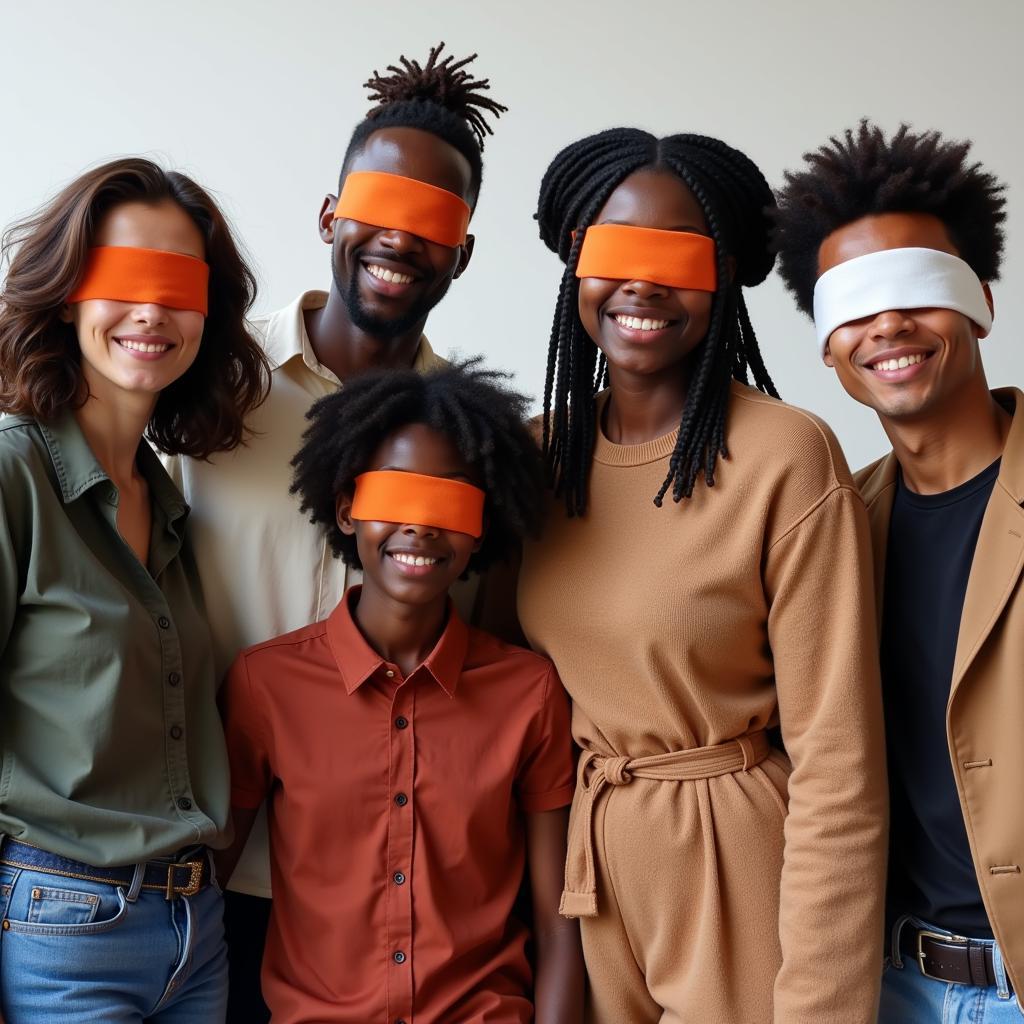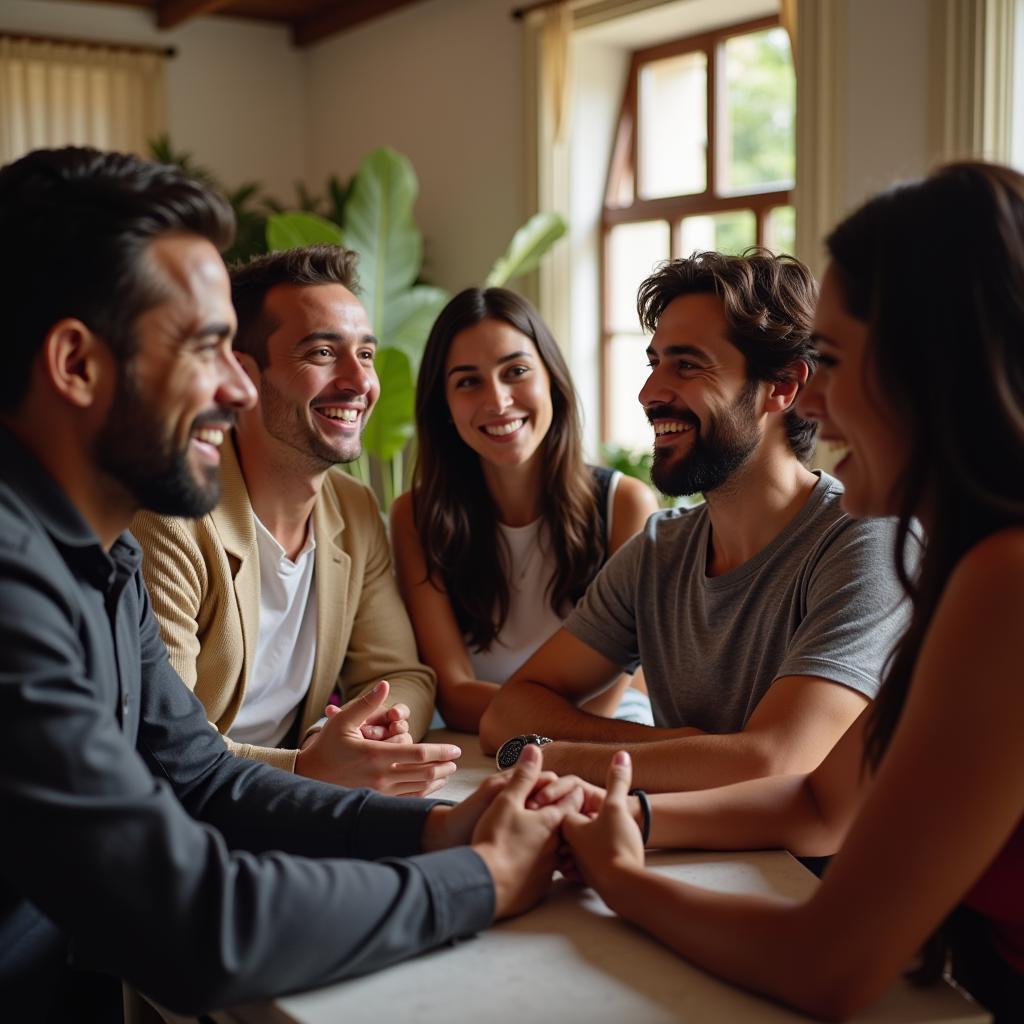The term “The Blind Society” often evokes thoughts of physical blindness. However, in a world teeming with biases and prejudice, it’s crucial to recognize the pervasive blindness that affects us all – the inability to see beyond our own experiences, beliefs, and prejudices. This societal blindness prevents us from truly understanding and connecting with those different from ourselves, fostering conflict and hindering peace.
The Invisible Barriers of a Blind Society
We often navigate the world confined by invisible barriers – walls built from fear, ignorance, and misinformation. These barriers prevent us from experiencing the richness of diverse cultures, perspectives, and ways of life.
 People from Diverse Backgrounds with Blindfolds
People from Diverse Backgrounds with Blindfolds
One of the most common manifestations of a blind society is the “echo chamber” effect. Through social media algorithms and selective news consumption, we often find ourselves surrounded by information that reinforces our existing views, shielding us from opposing perspectives. This creates a dangerous cycle of confirmation bias, hindering our ability to engage in constructive dialogue and find common ground.
Opening Our Eyes: Embracing Empathy and Understanding
Breaking free from the shackles of a blind society demands a conscious effort to cultivate empathy and understanding. It requires us to step outside our comfort zones, challenge our preconceived notions, and actively seek out diverse perspectives.
One powerful way to dismantle these invisible barriers is through meaningful conversations. By engaging with people from different backgrounds and actively listening to their stories, we gain invaluable insights into their lived experiences, struggles, and aspirations.
 People from Diverse Backgrounds Talking and Smiling
People from Diverse Backgrounds Talking and Smiling
Another crucial step is educating ourselves about different cultures, religions, and belief systems. By broadening our knowledge and understanding, we can dismantle stereotypes and challenge prejudices that often fuel societal blindness.
Building Bridges: Actions for a More Inclusive World
Creating a world where everyone feels seen, heard, and valued requires collective action. Here are a few ways we can contribute to building a more inclusive and understanding society:
- Challenge your own biases: Engage in self-reflection and identify any unconscious biases you may hold. Acknowledge that everyone has biases, and actively work towards unlearning them.
- Seek out diverse perspectives: Make a conscious effort to consume news and information from a variety of sources. Engage with people who hold different viewpoints and be open to learning from their experiences.
- Practice active listening: When engaging in conversations, focus on truly understanding the other person’s perspective, even if you don’t agree with it. Ask clarifying questions and avoid interrupting.
- Use your voice to advocate for inclusivity: Speak out against discrimination and injustice whenever you witness it. Support organizations and initiatives that promote equality and understanding.
Conclusion
The journey towards a world free from societal blindness is an ongoing process that demands continuous effort and commitment. By embracing empathy, challenging our biases, and actively seeking understanding, we can dismantle the invisible barriers that divide us and create a more just and peaceful world for everyone. Remember, the ability to see beyond differences is not a gift bestowed upon a select few, but a responsibility we all share.
FAQs
What is societal blindness?
Societal blindness refers to the tendency to overlook or dismiss perspectives, experiences, and realities that differ from our own. It’s a form of prejudice rooted in ignorance, fear, and a lack of exposure to diverse viewpoints.
How can I overcome my own biases?
Overcoming bias is an ongoing process that involves self-reflection, education, and exposure to diverse perspectives. It’s important to challenge your own assumptions, be open to new information, and actively seek out experiences that challenge your comfort zone.
What are some practical ways to promote inclusivity in my community?
Promoting inclusivity can involve supporting local organizations that work with marginalized communities, advocating for equitable policies, and creating welcoming and inclusive spaces where everyone feels valued and respected.
How can I engage in meaningful conversations about sensitive topics?
Engaging in difficult conversations requires active listening, empathy, and a willingness to understand perspectives different from your own. It’s important to approach these conversations with respect, humility, and a genuine desire to learn and grow.
What are some resources for learning more about different cultures and perspectives?
There are numerous resources available for expanding your cultural knowledge, including books, documentaries, podcasts, and online platforms dedicated to promoting cross-cultural understanding.
For further information and support on fostering peace and understanding, please contact us at:
Phone Number: 02043854663
Email: [email protected]
Address: Khu 34, Bac Giang, 260000, Vietnam.
Our dedicated team is available 24/7 to assist you.